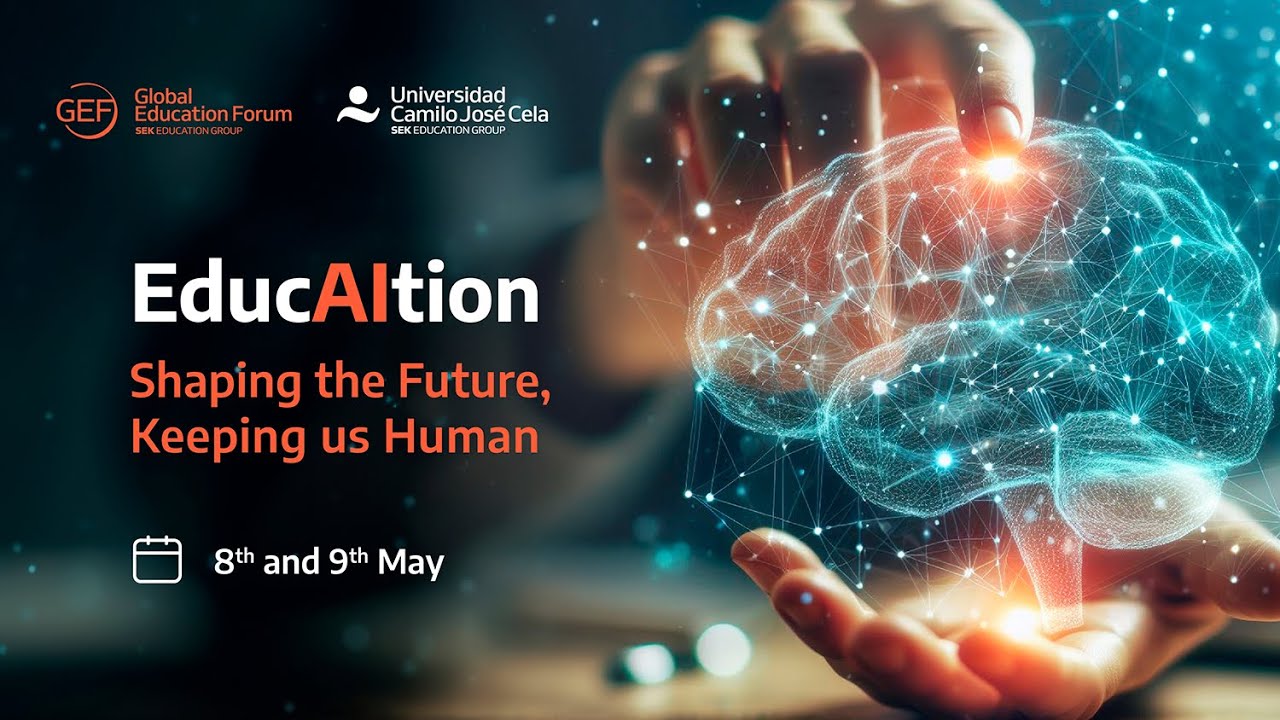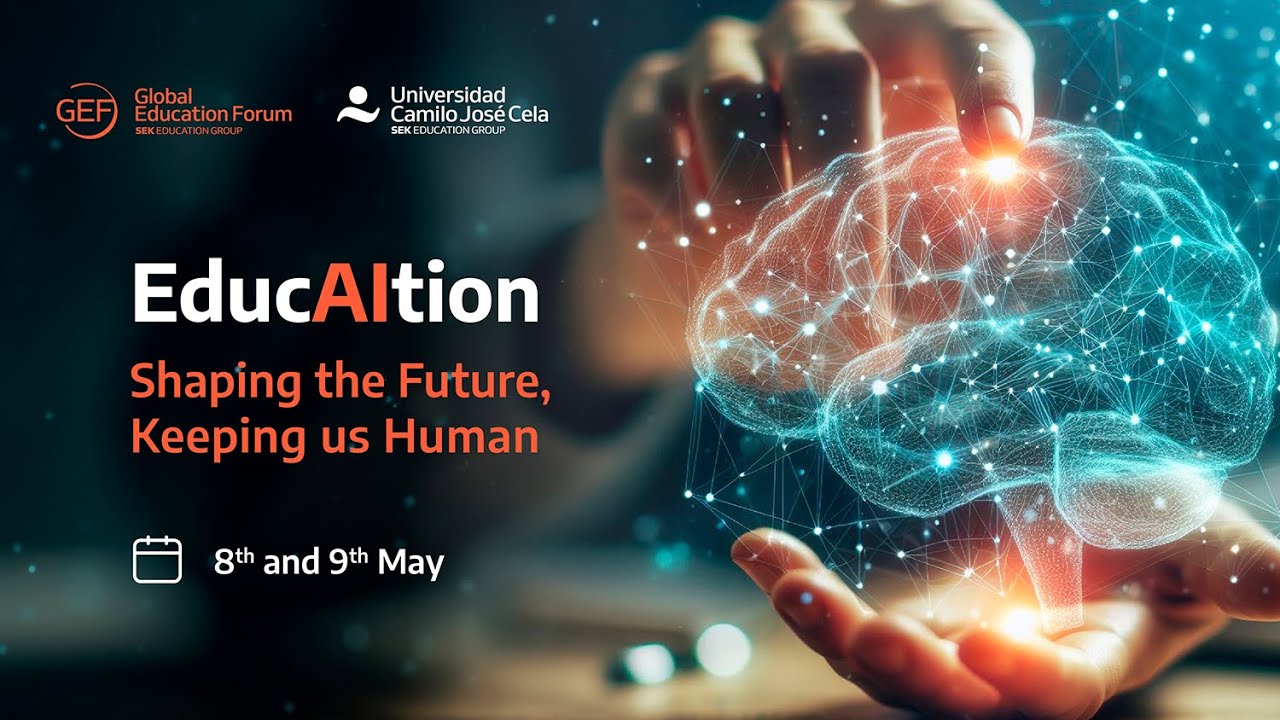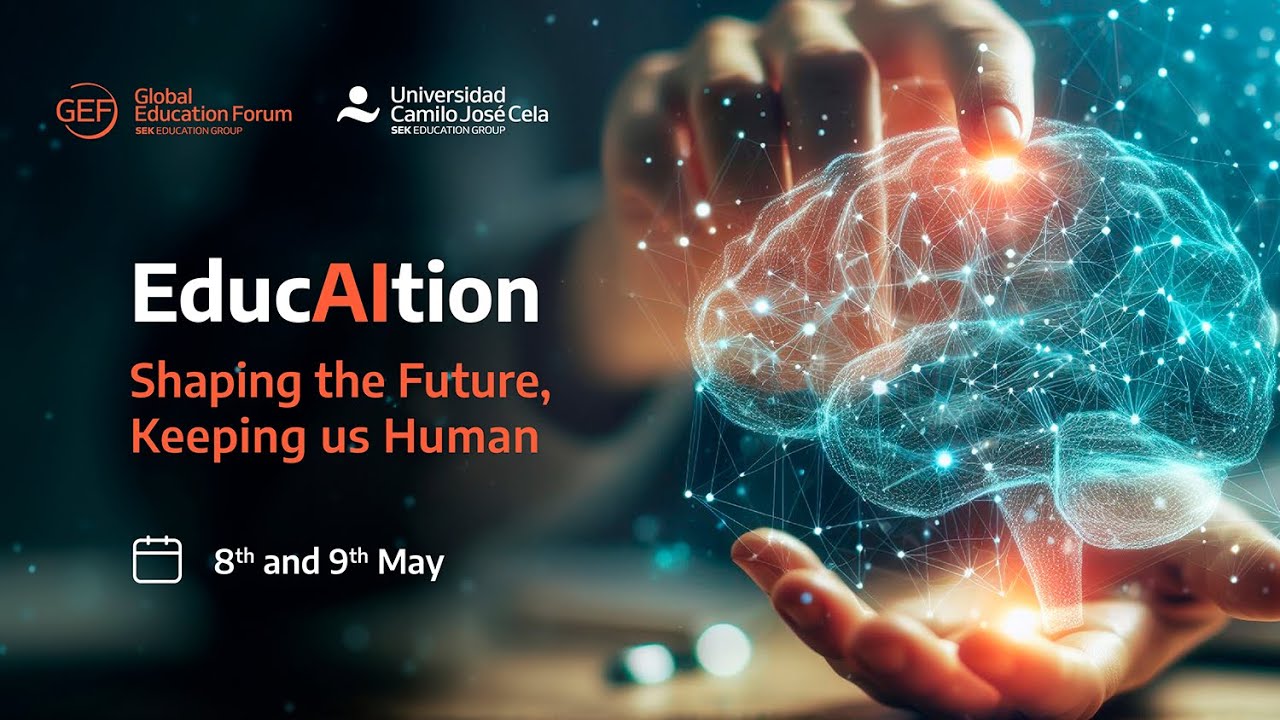GEF Madrid 2024: AI's role in Student Wellbeing
Summary
TLDRThis panel discussion at the Global Education Forum 2024 explores the intersection of artificial intelligence and student well-being. Panelists from diverse backgrounds, including education, psychology, and the tech industry, deliberate on the potential of AI to enhance personalized learning and mental health support, while also addressing ethical considerations and the importance of maintaining human connection in education. They emphasize the need for AI to augment, not replace, the crucial roles of teachers and the significance of emotional intelligence in student development.
Takeaways
- 🕒 The panel discussion is structured with 5 minutes for each participant to speak, followed by a minute for audience interaction and questions.
- 🌟 AIA, an insurance company headquartered in Hong Kong, is focused on operating in Asia and aims to help people live healthier, longer, better lives through various health and wellness initiatives.
- 🏆 The 'Healthiest Schools' program by AIA provides free health and wellness materials to schools, emphasizing the importance of physical, mental, environmental health, and nutrition.
- 🧠 There is a significant focus on mental health in the program, as it was identified as an area where students and teachers felt less prepared and needed more support.
- 🌏 The program's success is measured through research and case studies, which are then used to expand the program to more schools.
- 🤖 The role of artificial intelligence (AI) in education was discussed, highlighting both its potential to personalize learning experiences and the ethical considerations related to privacy and emotional intelligence.
- 💡 AI has the potential to move beyond traditional silos in healthcare, education, and mental health, offering more interdisciplinary approaches to student well-being.
- 👩🏫 The teacher-student relationship is crucial for student motivation, engagement, and academic achievement, and AI can assist in strengthening these relationships by managing administrative tasks.
- 💭 Emotional intelligence and AI are two different aspects of well-being; while AI can offer cognitive perspectives, it may not fully capture the complexity and natural spontaneity of human emotions.
- 🔑 Key challenges for AI adoption include ensuring data quality and the explainability of AI outcomes, which are vital for generating valid knowledge and understanding.
- 🌱 The optimistic conclusion is that AI, if used correctly, has the potential to enhance human experiences, making us not just more efficient, but more human.
Q & A
What is the main purpose of AIA's Healthiest Schools program?
-The main purpose of AIA's Healthiest Schools program is to deliver on AIA's purpose of helping people live healthier, longer, better lives, starting with the younger generation, and providing them with tools, motivation, inspiration, and education for health and wellness across various markets in Asia.
How does the AIA's Healthiest Schools program address the four pillars of health and wellness?
-The AIA's Healthiest Schools program addresses the four pillars of health and wellness, which include physical health, mental health, environmental health, and nutrition, by providing free health and wellness materials that are research-backed and curriculum-led to schools.
What is the role of teachers in the era of artificial intelligence in education?
-In the era of artificial intelligence, teachers can leverage technology to strengthen relationships with students, automate administrative tasks, and build emotional support, fostering a sense of belonging in the classroom, which are essential human elements for teaching and learning.
How can artificial intelligence be used to personalize wellness programs for students?
-Artificial intelligence can be used to analyze multiple variables and factors, providing personalized wellness programs that cater to the individual needs of students, potentially offering personalized mental health treatments and interventions.
What is the potential impact of AI on student engagement?
-AI has the potential to both positively and negatively impact student engagement. It could be used to create more engaging and personalized learning experiences, but there is also a risk of AI replacing human teachers, which could affect emotional engagement and the sense of belonging in the classroom.
What are the ethical considerations related to the integration of AI in education?
-Ethical considerations related to the integration of AI in education include privacy issues and ensuring that AI respects emotional intelligence and other factors essential for student development.
How can AI help in managing administrative tasks for teachers?
-AI can help in managing administrative tasks by automating processes, thus freeing up time for teachers to focus on building meaningful relationships with students and providing emotional support, which are crucial for student motivation and learning.
What is the importance of the teacher-student relationship in the learning process?
-The teacher-student relationship is crucial in the learning process as positive and supportive relationships are consistently linked to student motivation, engagement, and academic achievement.
How does AIA's Healthiest Schools program address mental health?
-AIA's Healthiest Schools program addresses mental health by providing materials and programs that focus on improving the mental well-being of students and teachers, recognizing the importance of mental health in overall health and wellness.
What is the potential risk of dependency on AI for emotional support and well-being?
-The potential risk of dependency on AI for emotional support and well-being is that it might lead to a decrease in human interaction and connection, and individuals might become reliant on AI for solutions rather than developing their own strategies for emotional regulation and well-being.
What are the challenges around AI adoption in education?
-The main challenges around AI adoption in education include ensuring data quality and the explainability of AI outcomes. It is crucial to educate the ecosystem about the validity of information and the importance of using AI responsibly to avoid misinformation and dependency.
Outlines

This section is available to paid users only. Please upgrade to access this part.
Upgrade NowMindmap

This section is available to paid users only. Please upgrade to access this part.
Upgrade NowKeywords

This section is available to paid users only. Please upgrade to access this part.
Upgrade NowHighlights

This section is available to paid users only. Please upgrade to access this part.
Upgrade NowTranscripts

This section is available to paid users only. Please upgrade to access this part.
Upgrade NowBrowse More Related Video

GEF Madrid 2024: Reporting the Future: The Impact of AI on Education Journalism

GEF Madrid 2024: Welcome remarks

Summit Hector Escamilla Shaping the Future, Keeping us Human GEF 2024

GEF Madrid 2024: Navigating AI Legal Frontiers

Guest and Speaker Testimonials GEF Madrid 2024 Nieves Segovia

Welcome remarks
5.0 / 5 (0 votes)